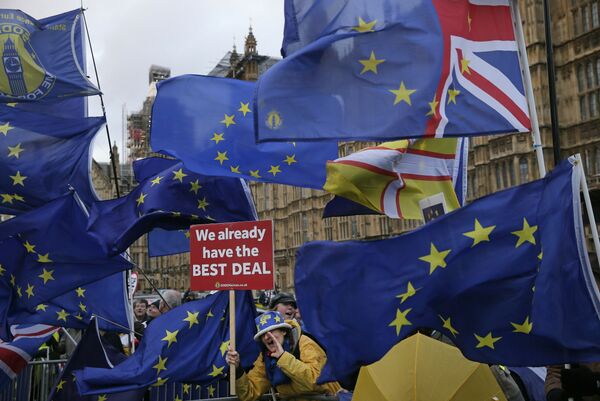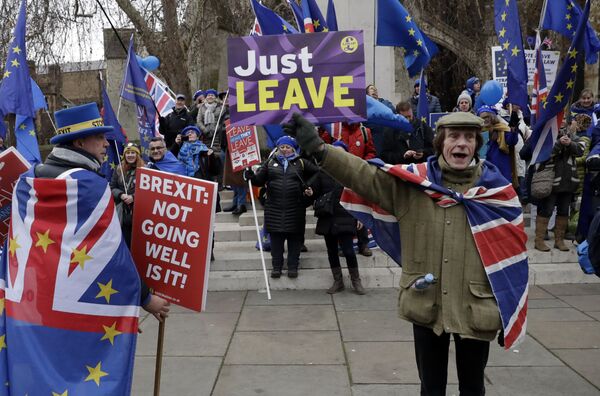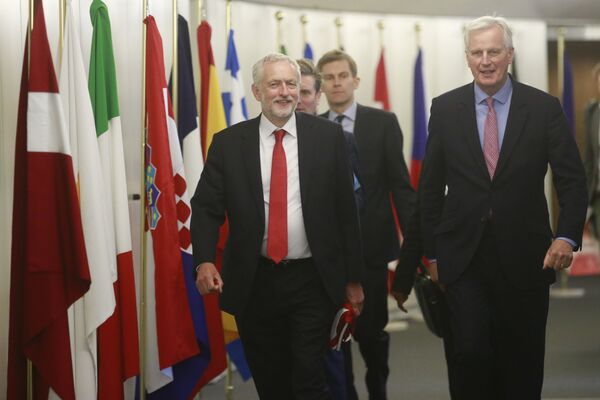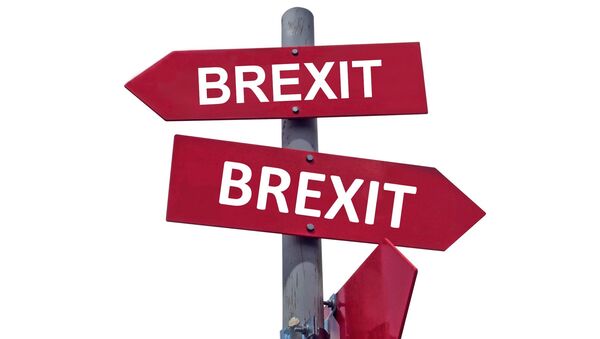John Bercow will choose a number of motions submitted by the British parliamentarians from a long list of 16 proposals on how the country should handle Brexit, including leaving the EU without a deal, remaining in the bloc's single market and customs union and holding a new referendum on Britain's membership in the bloc.
In another defeat for the government, the MPs have decided to take control of the parliamentary agenda from Theresa May's Cabinet amid ongoing stalemate in the PM's talks with the EU27.
READ MORE: LIVE UPDATES: UK Parliament Votes on Brexit Deal Amendments
Depending on the approval of today's Business of the House motion, here are the 16 #Brexit options the Speaker will be selecting from for the #IndicativeVotes held later today.
— UK House of Commons (@HouseofCommons) March 27, 2019
Read the full text of all the options here: https://t.co/UT3CUdEFq3 pic.twitter.com/Dp38rVoFXn
Here are the motions that the Prime Minister said she will consider but won't be bound by, whatever the result of "indicative votes" on Wednesday:
(A) Constitutional and accountable government
Proposed by Tory MP, Sir William Cash, the motion seeks to curb the power of MPs to take control of parliamentary time in the way they did on 25 March.
(B) No deal
The motion was tabled by Conservative MP John Baron and stipulates that the House of Commons agrees that the UK shall leave the EU on 12 April 2019 without a deal.
(C) Unilateral right of exit from backstop
Another one by John Baron MP that suggests MPs agree on the UK leaving the EU on 22 May 2019 with the Withdrawal Agreement amended to allow the UK unilaterally to exit the Northern Ireland backstop.
(D) Common market 2.0
A motion by Conservative MP Nick Boles proposes to renegotiate the framework for the future UK-EU relationship in order to allow Britain to accede the European Free Trade Association (EFTA), joining the European Economic Area (EEA); to establish a common external tariff with the EU; and to have proposals for the enforcement of the rule that EEA migrants must be "genuinely seeking work" and have "sufficient resources not to become a burden on the UK's social assistance."

(E) Respect the referendum result
The motion seeks for the House to uphold the results of the 2016 referendum on the membership of the European union and reaffirm its commitment to honour the outcome of the vote. The motion was submitted by Will Quince, Conservative MP.
(F) Participation in a customs union
Gareth Snell, Labour MP proposed that the government "takes all necessary steps to implement an international trade agreement which enables the United Kingdom to participate after exit day in a customs union with the European Union."
(G) Revocation instead of no deal
If the Parliament doesn't back Theresa May's Brexit deal four days before the end of the Article 50- period, the government should send a letter to the European Union revoking the UK's notice of intention, according to the motion submitted by SNP MP Angus MacNeil.

(H) EFTA and EEA
George Eustice, Conservative MP in his motion calls on Downing Street to "assert its existing rights as a signatory to the EEA" and take steps to ensure rights as an EEA member be operable on an emergency basis. It also says the government should to re-join EFTA at the earliest opportunity. Although it doesn't seek to enter a customs union with the EU, it would seek an agreement relating to the Northern Ireland border and agri-food trade. The proposal is against the customs union with Brussels but seeks new protocols on the Northern Ireland border and agri-food trade.
(I) Consent of devolved institutions
Leader of the Scottish National Party, Ian Blackford, tabled a motion to say the Parliament should note the rejection of the PM's deal and the no-deal scenario by the devolved governments in Edinburgh and Cardiff. The House should also agree that London won't leave the EU without a deal or take any action without a consent motion passed in both the Scottish Parliament and the Welsh Assembly.
(J) Customs union
The Conservative MP Ken Clarke suggested in this motion that the Brexit deal should include, as a minimum, a commitment to negotiate a permanent and comprehensive UK-wide customs union with the EU, as well as enshrine this objective in primary legislation.
(K) Labour's alternative plan
The leader of the opposition, Labour chief Jeremy Corbyn, has proposed a motion that requires the Brexit deal to include a permanent customs union, ‘close alignment with the single market', shared institutions, dynamic alignment on rights and protections, continued participation on EU agencies and funding programmes, and closer security arrangements.

(L) Revocation to avoid no deal
Joanna Cherry MP of the Scottish National Party suggested in her proposition that Theresa May's government should revoke Article 50 if on the day before UK's exit from the EU the PM's deal hadn't been approved and MPs had rejected leaving without a deal.
(M) Confirmatory public vote
The only other motion, submitted by a member of the Labour party — Margaret Beckett — outlines that any withdrawal agreement presented for ratification to the Parliaments should be approved by the people of the United Kingdom in a confirmatory public vote.

(N) Malthouse plan A
The Parliament should recognize the 2016 referendum result and accept the current Brexit deal, subject to the backstop being ‘superseded' by alternative arrangements, according to the motion tabled by Nicky Morgan, Conservative MP.
(O) Contingent preferential arrangements
A proposal by Tory MP Marcus Fysh outlines what UK should do if it leaves the EU without a deal. Namely, the government should "seek to agree immediately" a temporary two-year trade arrangement with Brussels, which would include no tariffs or quotas, full cumulation of rules of origin, mutual recognition of standards and a customs arrangement that simplifies checks and moves them away from border. In return, the UK would pay its net contribution to the bloc for two years.

(P) Contingent reciprocal arrangements
Another motion by Fysh sets out what unilateral guarantees offered by the EU should also be offered by the UK in case of a no-deal Brexit. This includes temporary access for some financial services and temporary permission for UK air carriers to fly across the EU. Additionally, the proposal says that Downing Street should guarantee EU citizens' rights.
MPs are expected to vote on a shortened list of motions — after the Speaker selects some but not all of tabled proposals — at 19.00 (GMT).




